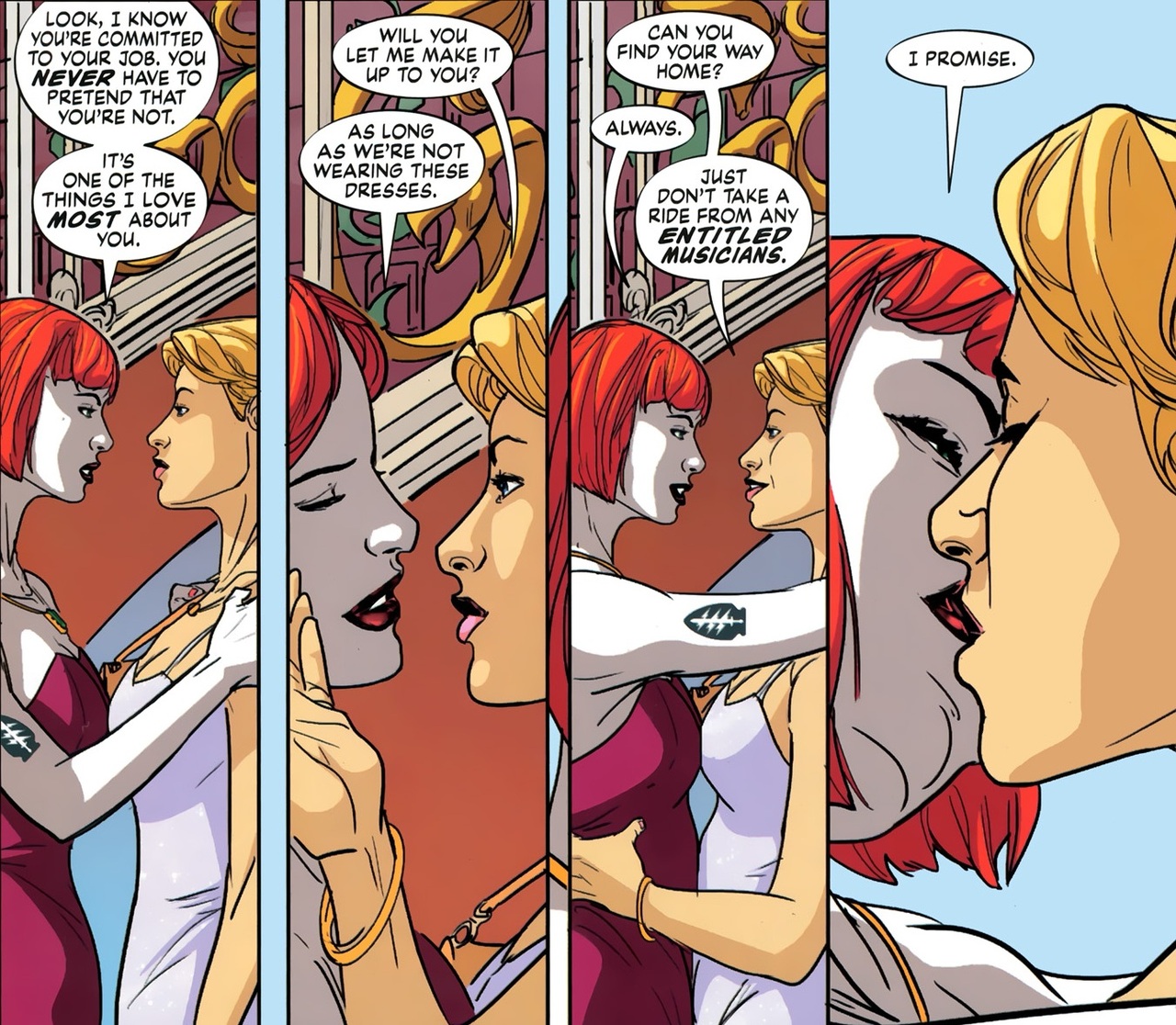A few weeks ago, DC Comics became embroiled in a controversy surrounding its Batwoman title. Co-writers J.H. Williams III and W. Haden Blackman announced they would be leaving the book because of editorial interference. One of the biggest problems the writers had was that DC editorial would not allow Batwoman (Kate Kane) get married to her fiancée, Maggie Sawyer, even though the writers had been working towards this plot point for a while. Although there was initial discussion that DC was against the marriage because it would be a controversial lesbian wedding, it turned out the reason was much simpler and stupid: they don't think their heroes should get married.
At the Baltimore Comic Con, DC co-publisher Dan DiDio said, "They put on a cape and a cowl for a reason. They're committed to defending others – at the sacrifice of all their own personal instincts... If you look at every one of the characters in the Batman family, their personal lives kind of suck... Tim Drake, Barbara Gordon, Kathy Kane – it's wonderful that they try to establish personal lives, but it's also just as important that they put it aside as they know what they are trying to accomplish as the hero takes precedence over everything else." DiDio was specifically referring to characters from the "Batman family" of titles, but looking at DC as a whole and seeing so few characters are married, it's not hard to imagine that this is a semi-universal policy.

It's not just DC that cracked down on creators impulses to marry off their characters. Marvel famously wiped out Spider-Man's long marriage to Mary Jane Watson simply because then Editor-in-Chief Joe Quesada thought that Peter Parker functioned better as a bachelor. It was also done in an inept way that infuriated and confused fans, though Spider-Man titles continued to sell well. Across the two companies, Superman, Green Arrow, Cyclops, Daredevil and many other heroes have all been married at various points and are currently not.
On one hand, it's understandable that these companies are wary of their heroes getting married. It's tied to one of the most central dilemmas of long-standing superhero comics: the passage of time. Marvel and DC have a great deal invested in keeping these characters viable as intellectual properties, which means wanting them "evergreen." However, an important part of these universes is the notion of continuity – that all of the stories published have happened. This leads to a paradox. How do you keep characters fresh (i.e., not age them) while also purporting to say that fifty years of published Spider-Man stories have happened to the character? So one reason Marvel and DC resist marrying characters is to keep them seeming younger.

There's another reason the companies avoid marriage, and this one is harder to defend. Quesada frequently alluded to the idea that it was harder to write good stories with Spider-Man married. Some writers did clearly struggle with giving Mary Jane anything worthwhile to do. I think this stems from the fact that historically mainstream comic books have been pretty terrible at writing non-superhero woman. Some might argue that they've been terrible at writing any female character, but it's especially rare to see a well-defined supporting female character without superpowers. Usually, as witnessed in many superhero movies, she ends up being a kidnapped damsel who needs rescuing. So I think there's also an unwillingness or inability to invest in developing good supporting female characters and writing a realistic marriage. This leads decision makers to view marriage as a hindrance to storytelling.
The thing about all of this, though, is that it's pretty absurd to think that marriage must avoided at all costs. Would stories as disparate as The Godfather or Breaking Bad be so much better if the main characters weren't married? Even in comics, Saga has racked up awards and high sales with the heart of the book being a very compelling marriage. Going back to DiDio's comments, why is it important that "what they are trying to accomplish as the hero takes precedence over everything else"? Isn't a fundamental part of writing good fiction putting characters in difficult situations? Isn't choosing between one's commitments to social/vigilante justice and one's commitments to loved ones/family a pretty interesting difficult situation?

Moreover, the history of Marvel and DC is filled with marriage. As rightly pointed out by Comic Book Covers Tumblr, comic book publishers love to create a buzz by marry their characters. The central premise of The Fantastic Four is that they are a family, and the marriage of Reed Richards and Sue Storm has provided a lot of great material over the years. Brian Bendis marrying Luke Cage to Jessica Jones was probably the best thing ever done to Cage. He's way more interesting as husband/father/superhero than he was as generic African-American street superhero. Also, Marvel did get a ton of publicity in 2012 by having gay superhero Northstar marry his longtime boyfriend, Kyle.

So the bias against marriage is frustrating because most readers of comic books are not kids and teen anymore. They are men in their 30s, 40s, and 50s. There are more adult female readers of comics now, too. I think it's simplistic to act like people don't want to read about the personal lives of superheroes. It's also simplistic, as implied by DiDio, to treat marriage as a "happy ending" – like comics are rom-coms. Marriage is not a character getting to be eternally happy any more than getting a promotion is eternal success. It's simply a new set of challenges with added responsibilities. Challenges and responsibilities, fueled by emotional attachment, sound like excellent ingredients to add to any story, even one with a cape and cowl.